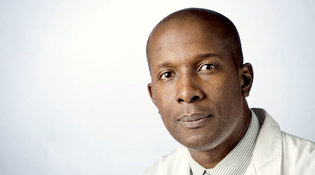 loading
loading
Where They Are NowDoctoring in a different cultureDamon Tweedy ’03JD talks about race-related health disparities—and his own experience as an African American physician.  Duke PhotographyAfter publishing the medical memoir Black Man in a White Coat, Damon Tweedy ’03JD received many positive reactions, and many very negative ones. “You can imagine,” he says. View full imageLast fall, Duke psychiatry assistant professor Damon Tweedy ’03JD published a memoir, Black Man in a White Coat. The book drew critical praise for its sensitive exploration of race in medicine, including its accounts of discrimination during his medical training and the health disparities African Americans face. Y: What reactions did your book receive? T: Most of the African American medical students and doctors said that at times they felt like I was writing their own life story. I’ve gotten a lot of feedback from doctors who are women, or Jewish, Muslim, or Asian, who felt like they could relate to this issue of being on the outside and navigating different cultures. But other people say some really harsh, negative things. You can imagine. The worst comment was from a doctor who said, “All the health problems in the African American community are their own” fault. Y: Your book recounts an incident in which a medical professor assumed you were a maintenance worker. T: There’s no doubt that microaggressions have pernicious effects over time. It affects how you perceive yourself, and if you become too preoccupied with it, it can impact your performance in school. How do you handle those situations? I hear this question a lot from students. Some situations are egregious enough that something more direct should occur: you should confront the person. There are other examples where people might say things that are potentially offensive, but there’s a cluelessness—they’re not necessarily malicious about it. Y: How did you begin writing? T: During downtimes on rotation, I’d put things on paper to make sense of what I was experiencing. Y: Why did you decide to go to law school before doing your psychiatry residency? T: The background I came from was very working class, and if you’re going to go to medical school, you had to follow a more traditional route. So when I got to medical school I was questioning: is this what I want to do for the rest of my life? I was seeing how much health was impacted by things outside of the hospital. I started thinking that I should become part of this other system to help out with these larger issues. About a year and a half into law school, I realized I did want to have some component of patient care to whatever I did, so I decided to get back into medicine. Y: How do health disparities manifest in your field? T: The mental health system is still not up to speed in terms of delivering care to poorer African Americans. There’s not an acknowledgment of some of the structural and social things these patients have experienced. Particularly in lower-income African American communities, trauma is impacting all sorts of issues. On the other hand, I see a lot of African American men overdiagnosed—schizophrenia, personality disorders. Paranoia is a symptom that’s associated with psychotic disorders. But if [a patient seems] like they don’t trust the doctor, there’s a whole legacy of why that person might be suspicious of the health care system. There’s [also] this fear of aggression by African American men, and I’ve certainly seen that as well. Y: Are you optimistic about improvements in health disparities in this country? T: I do struggle with the ways in which African Americans are often perceived or portrayed—there’s a sense of negativity that I still find discouraging. There has been progress. I do think we’re headed in the right direction. But we’ve still got a long way to go.
The comment period has expired.
|
|